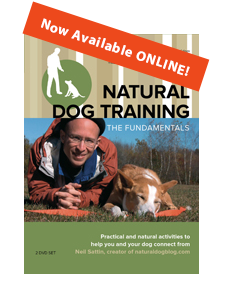Imagine if you tried to have a conversation with a friend of yours, and everytime you said something your friend said the exact same thing at the exact same time. Sure, it'd be creepy - and it would be impossible to get anywhere with your dialogue. Imagine if you went to see a symphony, and everyone in the orchestra on stage played the same note. You'd be bored and craving some variety, waiting for some instrument to break out of the monotony to give you something interesting to enjoy. Thankfully, life doesn't work that way. In order for communication to take place, everything in nature strives to differentiate itself, and our dogs are no exception. There are many reasons why you don't want your dog on the bed or on the couch, and this "need to differentiate" is the most important one. Let's talk about why.
The most important thing for you to do with your dog is to help your dog get relaxed and stay relaxed. Only a relaxed dog will be able to direct their energy in ways that are productive for them (and for you). Additionally, when you're inside (and I'm assuming that most of you keep your bed and your couch indoors) you have the added imperative of keeping things as low-key as possible. Since emotional energy is amplified indoors, most of the indoor excitement that your dog experiences is stressful, and that stress is stored up energy demanding an outlet. If your dog is doing anything dysfunctional - well, the energy found its outlet - and it's going to take some commitment on your part to redirect that energy and teach your dog a new way of handling their stress.
To our dogs, every place where they are has a feeling associated with it - a particular emotional "vibration". So imagine your dog is lying at the foot of the bed. You come along and get on the bed with your dog - you are effectively adding energy to the system, and your dog will use that energy to "differentiate" - otherwise the two of you would be at the same energy level in the same place and as unnatural as that one-note symphony. At this point, one of three things will happen:
- Your dog is truly relaxed and the additional energy just flows right through them. Nothing lost, nothing gained. This is the LEAST likely thing to happen, unless you have an ultra-relaxed emotionally healthy pooch.
- Your dog will take on that extra energy, and will get more energized in that moment. This creates exactly the opposite of what we want, a dog who's all stirred up inside the house. If a dog is confronted with one of their triggers in that moment (like say you have a dog who has been occasionally aggressive with children, and a neighbor's child happens to jump up on the bed), the additional energy will have a much higher chance of pushing the dog over their threshold and into a reactive overload state.
- Your dog will take on that extra energy, and it will be stored as stress for "discharge" at a later time. Energy in - energy out. It's going to happen at some point. If you have gotten to the point where your play, training, and pushing work leaves your dog feeling 100% satisfied then maybe this extra stress won't be problematic for you. If you have a dog that still goes into overload mode (aggression, anxiety, hyper-friendliness, submissive urination) then any extra stress in the system is stress that you want to try to avoid.
As a positive step, I suggest that you give your dog a place (such as a dog bed in the living room, or a cushion on the floor next to your bed) and encourage them to rest/hang out there. Use some tasty food treats to entice them to lie down quietly, and then, once they're in their spot, use long, slow massaging strokes on their neck and body to help them relax. Get up slowly when you're ready to move on - see if you can manage to move away without disturbing your dog's relaxed state. Look at this time as your "snuggle" time - that you otherwise might have had were your dog to be on your couch or bed with you. You will be helping your dog chill out AND giving them touch that truly sends them the message that their well-being is your utmost priority.
You are also giving some structure to your dog's life by giving them a place where it's indisputably ok for them to be. This place can become a haven for them to ESCAPE from otherwise stressful indoor situations (like when you're throwing a dinner party, or changing the layout of your bedroom, etc.). Remember that your dog always feels more secure when they're on the ground (or floor).
Here are some other reasons for not having your dog with you on the furniture:
- Less wear and tear on your furniture.
- Less pet hair on your clothing (and your guests' clothing).
- Much less likely to have a face-to-face encounter with your dog, which they experience as a threat from a predator.
- Less chance of fleas or ticks ending up on the humans in your family. MANY people have gotten lyme disease from a dog-borne tick that ended up in the bed or on furniture.
- Less pet dander (or allergens from the outdoors) making it into places where it could affect you.
Now lest you think I'm a total stickler for the rules, let me just say that there can be exceptions to this one. As a personal example, a few years back I was going through a pretty difficult emotional experience. When I would fall asleep at night Nola (my dog) would be in her usual spot, on her OWN bed, but when I woke up in the morning I would always find her right there next to me. I didn't experience any regression in her behavior (she's a formerly-known-as-aggressive dog), and after I was back to my usual, happy self she stopped climbing onto the bed in the middle of the night.
So there are times when your dog's emotional barometer might prescribe some contact as the solution to whatever vibe they're picking up from you - but those times should be few and far between. In fact, if you're going through a tough time then I recommend you get help from a friend or counselor - and not treat your dog as your own personal emotional crutch/validator. Since our dogs are so emotionally sensitive, that kind of interaction between the two of you can lead to - yep, you guessed it - more stress (for your dog). You wouldn't expect your children to solve your emotional problems - so take responsibility for yourself, get help, and give some more healthy moments to your dog.
If you have a rock solid and well-behaved dog, then you basically have nothing to worry about no matter what you do. On the other hand, if you're dealing with behavioral or obedience issues then you need to pay more attention to the way your dog's physical world is structured. Give them a space where they're free to be, and help them relax when they're in their spot. Keep the furniture off-limits, and you will decrease the chances of adding stress to your dog's life. In turn, they will be less likely to cause stress for you in your life. 🙂





You make some excellent points. Dogs do need to have their own places, their own sanctuaries.
My dogs all have their own pallets on the floor but they know they also have a place on the bed if they want. My alpha Poodle always sleeps on the bed.
As for fleas and hair, I think allowing dogs on furniture might be motivation to keep dogs flea free (I have done this for innumerable years), clean and well groomed. Daily brushing, regular grooming are important for any dog breed.
Thank you for your interest. I look forward to reading more from your blog.
Hi Jan,
I absolutely agree with you about the regular grooming and its importance, not only for physical health and cleanliness, but also for our dog's emotional heath.
Thanks for coming by!
Two things: first, another great post, Neil. Well done. I really like the way you explain the Natural Dog Training philosophy. I think it's really valuable in helping people understand and see the changes in their dogs's energy states.
Second, I don't know if Jan was being facetious when she referred to one of her dogs as an "alpha poodle." If not I want to direct her to my latest blog post, "Is Your Dog Dominant, or Just Feeling Anxious?" It explains the real basis of so-called dominant behaviors.
http://leecharleskelleysblog.blogspot.com
LCK
Excellent post.. I really like how you cover all the bases!
My dog actually -prefers- to sleep on his own bed. He will often rest on my bed(as he is now) while I sit at the computer(gives him a better vantage point of the entryways and window), but as soon as it's time to retire, he moves off.
I've had very similar experiences with Indy as you've had with Nola. Just more proof there is a constant exchange and communication of energy & emotion.
Thanks again for the great posts-- it is an invaluable resource for not only myself, but to point others to as well.
Hi Ben,
"Just more proof there is a constant exchange and communication of energy & emotion."
Absolutely!
Glad to be of service, and thanks again for coming by.
Neil,
I need some advice. My Bulldog, 3 years old, developed a habit of whining for attention, playing, and if I am in another room even without her being near me. Though the attention is great, the sound is grating and annoying. I would love to train her to sleep on her own bed but she wanders at night, getting into trouble and then cries to come up on the bed.
Do you think putting her in a crate and just letting her cry is the solution?...Any advice you could email me would help. I have been incorporating the prey aspects in our play and I have noticed a more calming affect on her. She just doesn't relax....
Hi Brendan,
I'd definitely keep at it with the prey drive. If you haven't yet, you should check out my article on how to relax your dog. Focus on that, and also my article on crate training. Hope that helps.
Just be patient - it can take time for habits to change, but they will as long as you're consistent and stick w/the program. 🙂